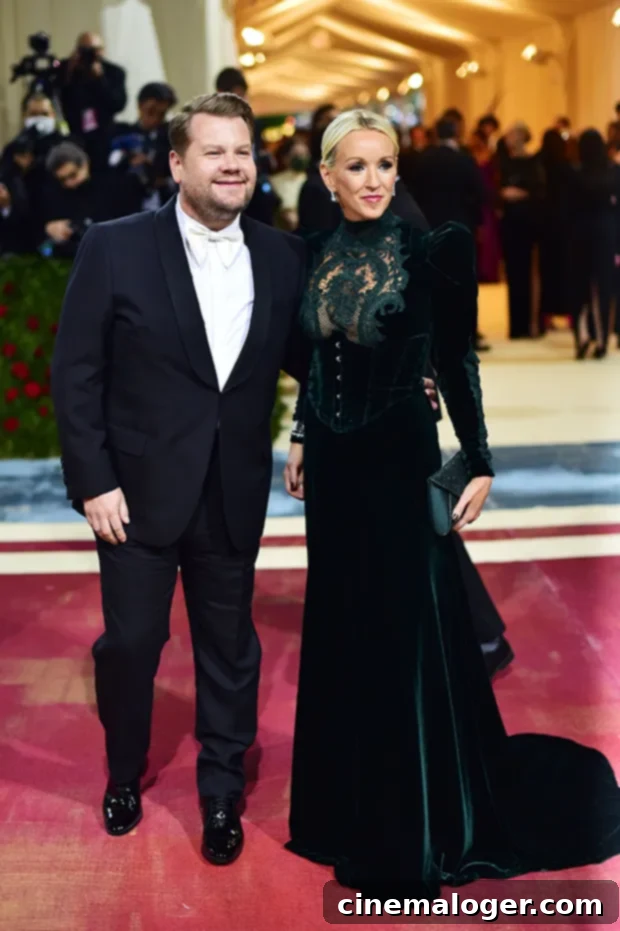James Corden’s Balthazar Ban: Navigating Public Scrutiny and Finding His ‘Zen’ Amid Restaurant Controversy
The whirlwind of public opinion and media scrutiny can often leave even the most seasoned celebrities reeling, but for talk show host James Corden, a recent high-profile restaurant incident appears to have largely rolled off his back. Corden, known for his jovial demeanor and hit segments like “Carpool Karaoke” on The Late Late Show, found himself at the center of a media storm after acclaimed New York restaurateur Keith McNally publicly banned him from his establishments, including the iconic Balthazar. Despite the widespread online chatter and subsequent unbanning, Corden expressed a remarkably calm and detached perspective on the entire affair, likening his emotional state to “so Zen.”
In an exclusive interview with the New York Times, published on Thursday, October 20, Corden addressed the controversy that saw him briefly barred from McNally’s renowned eateries. He firmly asserted, “I haven’t done anything wrong, on any level.” This statement underscored his seemingly unshakeable confidence in his conduct, or at least his perception of it, despite the detailed accusations that had surfaced. He further elaborated on his feelings, stating, “I feel so Zen about the whole thing. Because I think it’s so silly. I just think it’s beneath all of us.” This dismissive attitude, while potentially frustrating to critics, highlights a deliberate choice by Corden to rise above the fray and not engage with what he perceives as trivial public discourse.
Corden’s Poised Response to Allegations
While James Corden chose not to directly recount his version of the alleged incidents at Balthazar, his humor provided a subtle acknowledgment of the situation. Times reporter Dave Itzkoff noted a telling moment during their interview. As a woman at a nearby table voiced a complaint about her eggs, Corden reportedly quipped, making a lighthearted reference to one of the central accusations leveled against him by Keith McNally. This particular incident, widely publicized, involved Corden allegedly complaining vehemently about his wife Julia Carey’s egg-yolk omelet not being prepared to her satisfaction, despite multiple attempts by the restaurant staff.
This playful jab by Corden served multiple purposes. It demonstrated his awareness of the specific allegations without granting them undue seriousness. It also showcased his ability to find humor in a potentially damaging situation, a trait often associated with his on-screen persona. Nevertheless, the host of The Late Late Show acknowledged the inevitability of addressing the issue more formally. He remarked that he was “probably going to have to talk about it on Monday’s show,” signaling a forthcoming on-air response that would likely provide his audience with a more comprehensive, albeit still carefully curated, perspective on the events.

The Disconnect: Online Backlash vs. Real-World Experience
Corden’s detachment from the online discourse surrounding him was a recurring theme throughout his interview. He confessed, “I haven’t really read anything. It’s strange. It’s strange when you were there.” This sentiment suggests a significant gap between the digital narrative spun by social media and the actual events as experienced by those involved. For Corden, the virality of the story felt distant and distorted, possibly because he knew the full context, or believed he did, unlike the anonymous masses online.
He articulated his personal philosophy on such matters: “My feeling, often, is, never explain, never complain. But I’ll probably have to talk about it.” This mantra, common among public figures, aims to prevent an issue from escalating by not giving it more oxygen. However, in the age of constant connectivity and instant virality, such a passive approach can sometimes be perceived as dismissive or even arrogant. Corden’s decision to eventually address the issue on his show indicates a strategic move to control the narrative, offering his perspective directly to his loyal audience rather than allowing the online frenzy to define the story.
Perhaps the most striking point Corden made was his observation about the disparity between online backlash and real-world interactions. Despite the intense criticism he faced on social media platforms, the “Carpool Karaoke” host noted that this digital uproar had not translated into tangible repercussions in his daily life. “Should we not all be a little grown-up about this?” he questioned, suggesting a disproportionate reaction from the online community. He confidently added, “I’ve been here, been walking around New York, not one person’s come up to me. We’re dealing in two worlds here.” This statement powerfully illustrates his belief that the digital realm fosters an exaggerated sense of outrage that often fails to reflect the reality of everyday interactions. For Corden, the anonymity and distance of the internet create a space where accusations can be amplified without genuine real-world consequences, an observation many public figures share.

Keith McNally’s Public Accusations and the Power of Apology
The entire controversy erupted when Keith McNally, a veteran restaurateur with a significant public presence, took to Instagram to lambast James Corden. McNally’s initial post went viral, catapulting Corden into a trending topic. The restaurateur did not mince words, labeling Corden a “cretin of a man” and asserting that he was the “most abusive customer” in Balthazar’s 25-year history. McNally’s post detailed two alleged incidents, painting a picture of Corden as a demanding and disrespectful patron. The first incident, from June, involved Corden reportedly finding a hair in his food and demanding free drinks, threatening a negative Yelp review if his demands weren’t met. The second, more recent incident from October, concerned his wife Julia Carey’s omelet, which was allegedly returned multiple times due to issues with the egg yolk.
The public nature of McNally’s allegations ensured immediate and widespread coverage, igniting a fervent debate online about celebrity entitlement, dining etiquette, and the treatment of service industry staff. However, the narrative took a significant turn just hours later. Following his initial post, McNally issued a follow-up, revealing that Corden had personally called him and “apologized profusely.” This swift and apparently sincere apology led McNally to rescind the ban, demonstrating the power of a genuine apology, even in the glare of the public eye.
McNally, ever the showman, explained his decision with characteristic candor: “Having f**ked up myself more than most people, I strongly believe in second chances.” He added, “Anyone magnanimous enough to apologize to a deadbeat layabout like me (and my staff) doesn’t deserve to be banned from anywhere. Especially Balthazar.” This magnanimous gesture by McNally shifted the public perception, illustrating a nuanced approach to dealing with public figures who, despite alleged missteps, are willing to take responsibility. It also highlighted McNally’s own philosophy of empathy and forgiveness, suggesting that even in the cutthroat world of New York hospitality, grace can prevail.
The Broader Conversation: Celebrity Behavior, Public Image, and Social Media
The James Corden Balthazar incident, while resolved relatively quickly, ignited a broader conversation about celebrity behavior in public spaces and the immediate impact of social media on such controversies. Celebrities, by virtue of their public personas, are held to a different standard, and their actions in private settings can quickly become public fodder. The speed at which McNally’s Instagram post went viral demonstrates the pervasive power of social media to disseminate information, shape public opinion, and sometimes, unfairly condemn individuals without full context. This incident served as a potent reminder that in the digital age, discretion is paramount, and even a minor interaction can escalate into a global headline.
For James Corden, who has cultivated a generally affable and charming public image through “The Late Late Show” and its popular segments, the accusations were a rare crack in his carefully constructed persona. As he prepares to conclude his run on the show in 2023 and return to the UK, such incidents inevitably raise questions about how they might impact his future career endeavors. His decision to remain “Zen” and address the issue on his own terms reflects a strategic effort to manage his public image and maintain control over his narrative in an increasingly chaotic media landscape. The Balthazar incident, ultimately, became a fleeting moment of controversy, quickly resolved, yet leaving behind lingering questions about the ethics of public shaming and the true cost of celebrity.
